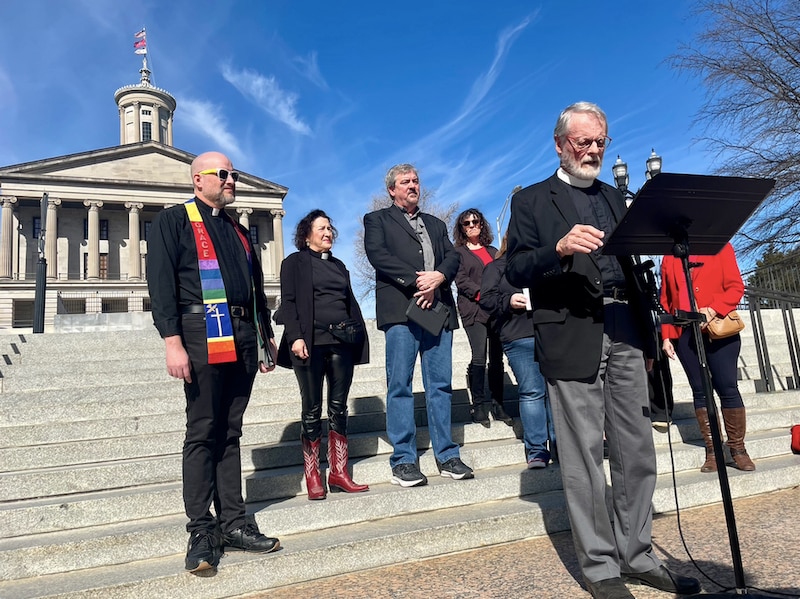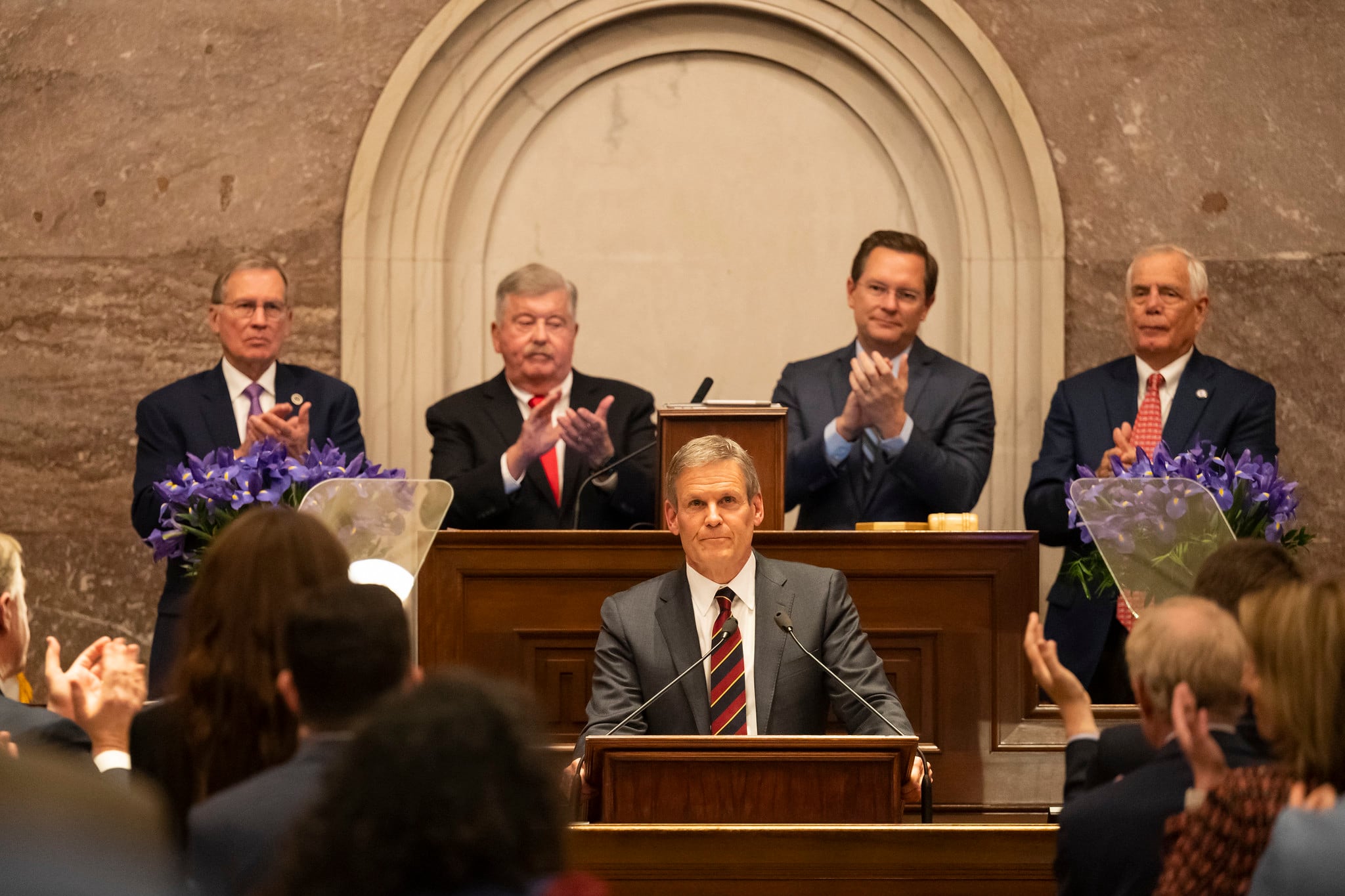Gov. Bill Lee announced Monday that he’ll propose legislation to increase the minimum salary for Tennessee teachers from $41,000 to $50,000 over the next four years.
If the proposal passes, the new base salary in the fall of 2027 would be up 42% from 2019, Lee’s first year in office, when the state’s minimum teacher pay was $35,000.
The Republican governor has sought to raise teacher compensation annually and said he wants $125 million more toward pay increases next school year.
He didn’t give details about his long-term pay proposal during his state address Monday night before a joint session of the Tennessee legislature. But his brief comments about teacher compensation prompted two standing ovations from lawmakers in a state that ranks toward the bottom in K-12 funding and where many teachers have to work 10 to 15 years to reach a salary of $50,000.
Lee’s education chief, Penny Schwinn, told Chalkbeat that a large jump in base pay would transform efforts to recruit educators to the profession — and retain them in subsequent years.
“This is a game changer in terms of how we talk about the profession, how we compensate the profession,” Schwinn said. “This is that retention component that is going to be critical.”
Raising base pay would have a “domino effect” on how more experienced teachers are paid, too, she said.
“You raise the minimum, which raises the midpoint, which raises the end-point salary. That’s what we see every year that we’ve raised the base salary by about a thousand dollars. You see a domino effect for all of the salary schedules statewide,” Schwinn said.
In conjunction with his address, Lee’s administration released his $55.6 billion proposed budget for next fiscal year, recommending that the state’s largest new investment — $3.3 billion worth — go to repair and build roads and bridges to address Tennessee’s decaying transportation infrastructure.
For education, he proposed adding $350 million to the $750 million in recurring funds already approved to launch the state’s new education funding formula, known as the Tennessee Investment in Student Achievement, or TISA, which takes effect July 1. Signed into law last year, TISA will replace the state’s 30-year-old funding system and sets a base funding rate of $6,860 per pupil, then distributes additional money to support students who need the most help.
The governor asked the legislature to approve one-time funding of $20 million for school safety grants and nearly $30 million for a related school safety initiative to hire at least one Homeland Security special agent in each of the state’s 95 counties to work with local schools and law enforcement.
“We’ve done a lot to make schools safer, but I don’t want to look up months from now and think ‘we should’ve done more,’” said Lee, promising to prioritize school safety every year he’s in office.
He’s also asking for recurring new funding of nearly $61 million to extend summer learning camps across Tennessee and to expand eligibility from grades 4-8 currently to kindergarten through the ninth grade, plus $10 million to provide bus transportation to and from those camps.
Lee seeks more funds for charter commission
Lee used his annual address to tout both public schools and voucher programs that give parents taxpayer money to send their children to private schools. He introduced Vincent Hunter, principal at Whitehaven High School in Memphis, which has expanded dual enrollment, advanced placement, and foreign language course opportunities and boasts a graduation rate above 90%. He also introduced Nashville fourth-grader Natalia Serrano, who enrolled in Holy Rosary Academy through Tennessee’s education savings account program, which kicked off this school year.
“I have always believed that we should strive to have the best public school system in the country — and provide choices for parents,” Lee said.
But Lee made no mention of charter schools in this year’s address, after using the platform a year ago to endorse a “partnership” with Michigan’s Hillsdale College to open classical charter schools in Tennessee that align with his conservative ideology. That effort initially failed (although Hillsdale’s American Classical Education charter group is trying again and recently submitted applications to open schools with five Tennessee districts).
Lee’s spending plan, however, includes more than $1 million more in recurring funding to support the state’s new Charter School Commission and its growing portfolio of state-authorized charter schools.
In his speech and budget blueprint, the governor called for more support for new mothers, foster care, and crisis pregnancy centers. He proposed investing $193.5 million to bolster the state’s embattled children’s services agency, which has been under scrutiny for sweeping failures in overseeing Tennessee’s most vulnerable children.
“DCS caseworkers have an incredibly difficult job, and they deserve our support,” Lee said. “Last year, we provided two pay raises for caseworkers, and I intend to boost their pay again in this budget.”
Critics say Lee’s policy plans fall short
The governor’s teacher pay proposals drew cautious comments from the Tennessee Education Association, the state’s largest teachers organization, which noted that Alabama’s minimum starting salary for a teacher this year is $43,358.
“Tennessee has a long way to go to reach Gov. Lee’s goal of a starting salary of $50,000, but the state is well positioned to make this a reality sooner rather than later as we continue to record significant surpluses,” the group said in a statement.
For instance, Tennessee tax collections for the current fiscal year have been beating forecasts by hundreds of millions of dollars. And for the new fiscal year that begins in July, Lee proposes adding another $250 million to the state’s “rainy day” reserve fund, which is already at a record high.
Meanwhile, “teachers, like other Tennesseans, have been affected by inflation and rising costs in the family budget,” said TEA President Tanya Coats. “More can be done to improve the economics of being a professional teacher in our state.”
Outside the Tennessee Capitol earlier Monday, a small group of Nashville-area pastors called on the governor to pursue policies that benefit everyone, not just a select few people or special interest groups.
“There is nothing more beneficial to the common good than fully funded, high-quality public education,” said the Rev. Kevin Riggs, pastor of Franklin Community Church in Franklin.

Riggs criticized new state laws aimed at banning books in classrooms and school libraries, holding back third graders if they don’t test as proficient in reading, and targeting LGBTQ students.
“These policies are failing our families,” he said. “We need to listen to teachers and principals and support the work of our public schools, making them stronger and our communities healthier.”
Over the weekend, House Minority Leader Karen Camper urged the governor to halt any policies that drain money from public schools, such as vouchers.
“Let’s invest in pre-K, smaller classroom sizes, and professional teachers who are preparing our children, not just for this decade, but for those beyond our lifetimes,” said the Memphis Democrat, in her party’s “prebuttal speech.”
“We must guard against the expansion of policies that result in the re-segregation of schools,” Camper continued. “If we ignore our past, we insult the struggles of so many heroes like Ruby Bridges, the Memphis 13, and Clinton 12, who passed down progress and inclusion in every generation since.
Tennessee lawmakers will begin reviewing the governor’s budget this week in their finance committees. The legislature must approve a final budget before recessing for the year this spring.
You can read the governor’s full address here
Marta Aldrich is a senior correspondent and covers the statehouse for Chalkbeat Tennessee. Contact her at maldrich@chalkbeat.org.







